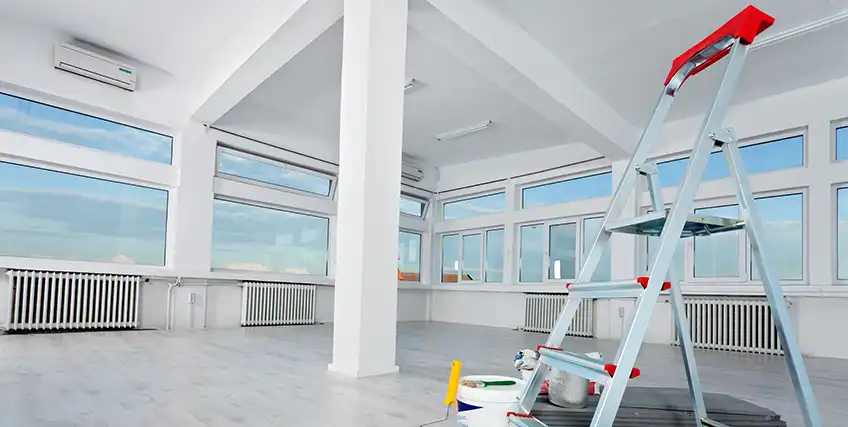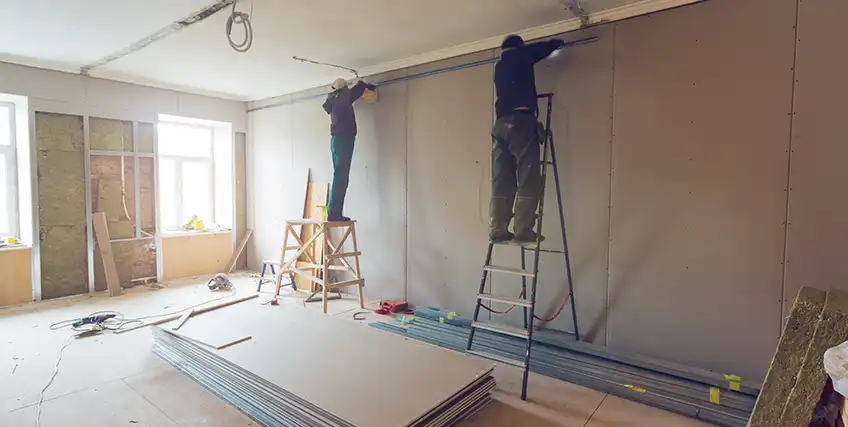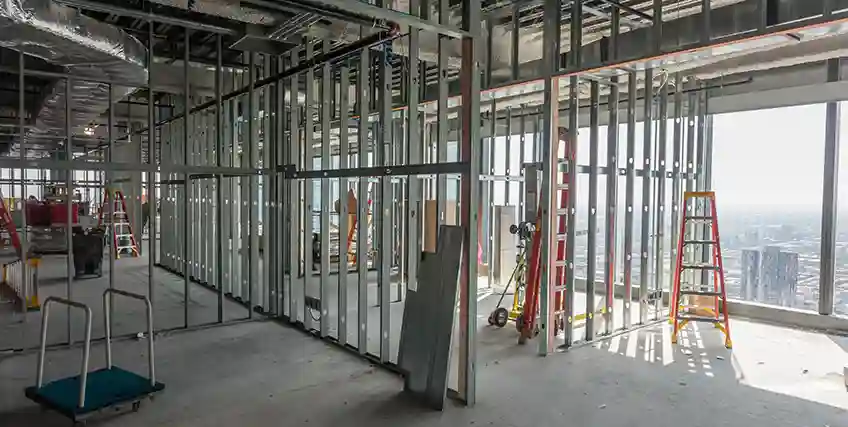Small Business Renovation Financing: What You Need to Know
December 09, 2025 | Last Updated on: December 09, 2025

Giving your business space a facelift can actually revitalize your operations, get you more clients and boost overall efficiency. But it can burn a hole in your pocket. The cost for any such renovation can be substantial - something that might prove to be a bit too much for a lot of small business owners. This makes business renovation financing an important tool for small business owners.
You can be thinking of modernizing your office or expanding your workspace or even remodelling your retail space. That's why securing the right renovation financing is important. There are options like SBA loans for renovations, office renovation loan and other financing products for renovation that can offer the required funds to meet your business goals.
It is imperative for small business owners to understand various aspects of financing options such as eligibility criteria and application process to make a smart decision and avoid potential liabilities. This article will explain the essentials of business renovation financing so that you have all the required information with you with you begin your renovation journey.
Understanding Business Renovation Financing
Business renovation financing generally include a range of loan products designed to fund upgrades to commercial spaces. The upgrades can be for structural changes, aesthetic renovation or technological enhancements that can improve business performance.
Some of the popular financing options include the SBA loans, offering favorable terms for qualified small businesses, and the office renovation loan, which is customized for businesses looking to remodel their office spaces. Other renovation funding solutions fulfil other business needs like minor refurbishments and even major overhauls.
The eligibility criteria for these loans tend to depend on aspects like credit score, business history, and the scope of the renovation project. Every business owner looking to apply for this particular financing product need to completely understand the requirements to secure the right financing products for their businesses.
You can have the office of your dreams by just exploring the available financing options and aligning them with your renovation goals.
Types of Renovation Financing Options
To begin your funding journey to renovate your business space, let's figure out just how many types of renovation financing options are available in the market. There are various funding options catering to specific business needs, project scopes, and financial situations. Don't just jump in and apply for the first loan product you see.
1. SBA 504 Loans
SBA 504 loan program is one of the popular programs under SBA loan umbrella. For qualified applicants, this program provides long-term, fixed-rate financing for major fixed assets like buying or revamping commercial real estate, and acquiring pieces of heavy equipment. If you're thinking of doing significant renovation or expansion work, you might find this type of loan more suitable than others. The term duration can stretch up to 25 years and down payments are also considerably low. This loan product is designed with a 50% contribution from a conventional lender, 40% from a Certified Development Company (CDC), and a 10% borrower contribution.
2. SBA 7(a) Loans
Another funding program that is a part of the SBA funding solutions is the SBA 7(a) loan. It offers financial aid to small businesses by providing flexibility to meet various business needs like renovations, working capital, equipment purchases, etc. You can get loan amount up to $5 million, with repayment duration extending to 25 years for real estate. Most suitable for businesses looking for a comprehensive loan option for their renovation projects.
3. aditional Bank Loans
Traditional bank loans provide lump-sum financing with fixed or variable interest rates. They often require a strong credit history, collateral, and a solid business plan. These loans can offer competitive terms for businesses with established financials seeking renovation financing. However, the application process may be more rigorous and time-consuming compared to other financing options.
4. Online Lenders
Taking an edge over conventional funding options, online lenders promise applicants quick access to funds with a very streamlined application process. Though they might charge higher interest rates than regular banks, but they partner well with applicants needing fast renovation loan approvals. Online lenders often have more flexible qualification criteria, which make them very attractive to businesses with varying credit profiles.
5. Business Lines of Credit
Another popular product in the arsenal of renovation financing is a business line of credit. It provides flexible access to capital by letting you withdraw money as needed for ongoing renovation projects. If your business has fluctuating renovation costs or even phased improvement plans, you might want to explore this product more. Since interest is paid on the amount withdrawn, it provides a revolving source of capital for your renovation needs.
Factors to Consider Before Applying
If you're looking for the right funding solution for your business needs, start by assessing the following factors before you even apply for business renovation financing:
a. Credit Score
When it comes to securing financing, having a strong credit score can go a long way. It can help you get funding at favorable terms. So, before you apply for a loan, review your credit reports for accuracy and check any issues that may crop up and resolve them asap.
b. Business Financials
Your business's financial health, including revenue, profit margins and cash flow, can either bolster a lender's confidence in you or break it. You need to maintain accurate financial statements to show your ability to repay the loan.
c. Loan Amount Needed
Take just what you need. You should determine the total cost of your renovation project to know exactly how much amount you would require. Get detailed estimates from contractors to support your application.
d. Repayment Terms
You need to understand the repayment schedule of your loan, including interest rates and monthly payments. You also should ensure the terms align with your business's cash flow and financial projections. Otherwise, you can get into financial trouble later on.
e. Collateral Requirements
Though not all loans require collateral, but some do like property and equipment. So, you should evaluate your assets to know which one you can offer as security.
Steps to Secure Business Renovation Financing
When it comes to securing business renovation financing, there are a few important steps that you need to follow for a successful application process:
1. Assess Renovation Needs and Costs
You need to have a clear idea of the scope of your project and get detailed cost estimates. This will help you understand how much money you need and will go a long way to support your application.
2. Review Credit Reports and Financial Statements
Look at your credit reports carefully for any errors. Keep your other financial documents in order, such as income statements and balance sheets. It will help in presenting a clear picture of your business's financial health.
3. Research and Compare Lenders
Don't just settle in on the first lender you come across. Shop around for other loan providers too - traditional, online and alternative - to zero in on the best financing option that will meet your business needs withoutputtingastress on your cash flow or financial reserves.
4. Prepare Necessary Documentation
Keep documents like tax returns, business licenses and renovation plans ready to ensure you have them handy if the lenders ask for it. It also shows your preparedness for the application process.
5. Submit Applications and Follow Up
Always submit a complete application. And don't forget about it once you apply. You need to follow up and maintain communication to answer any information request they may have for you. This way, you can also track the application's progress.
Tips for Successful Renovation Financing
To secure business renovation financing successfully, you should have strategically planned all your moves. But, it still helps if you know some tips that can help you navigate this process effectively:
1. Develop a Comprehensive Renovation Plan
Like with most financing products, you need to have a plan. This should be ready even before you apply for a loan. So, you need to start by drafting a detailed renovation plan that outlines the project's scope, timeline, and budget. This way, the lenders will understand that you are thoroughly aware of the project's requirements and are ready to face any challenges, if they come up.
2. Maintain Accurate Financial Records
For a smooth and hassle-free loan application process, it is important that your financial records are accurate. Otherwise, a lot of time might go into back and forth. Having the right and correct document ready will give lenders an idea about your business's financial health. So, ensure your documents, including income statements and balance sheets, are in order.
3. Choose the Right Financing Option
Not every financing product is suited for specific projects. Even renovation projects may need customized funding solutions. For example, an SBA loan might be better for substantial structural changes, while a business line of credit could fund smaller, ongoing improvements. Thoroughly check your project's needs to find the best funding solution for you.
4. Understand Loan Terms and Conditions
Thoroughly review the terms and conditions of any renovation loan before committing. Pay close attention to interest rates, repayment schedules, and any associated fees. Understanding these details ensures that the loan aligns with your business's financial capabilities and long-term goals.
5. Consult with Financial Advisors
A lot of applicants tend to ignore this step, till it's too late. Consulting with financial advisors can be very helpful as they give insightful information aboutrenovation financing process. Their advice might even help you steer away from potential financial pitfalls.They can help analyze your financial situation, recommend suitable financing options, and even guide you through the application process, increasing your chances of securing favorable loan terms.
Common Mistakes to Avoid
When pursuing business renovation financing, avoiding common pitfalls is crucial to ensure a smooth process and financial stability.
1. Underestimating Renovation Costs
You need to know all the expenses involved in the project. Any failure to account for costing can result in budget shortfalls. Moreover, you need to create a contingency fund of 10–20% to brace yourself for unexpected costs like structural issues or permit delays. Correct estimates can help in securing adequate renovation financing that you need.
2. Choosing the Wrong Loan Type
Selecting an inappropriate loan can result in unfavorable terms. Assess your needs carefully; SBA loans are ideal for long-term projects, while a business line of credit suits ongoing expenses.
3. Ignoring Permit Requirements
Skipping necessary permits can cause legal issues and project delays. Ensure all local regulations are met before commencing renovations to avoid fines and work stoppages.
4. Not Comparing Contractor Bids
Accepting the first contractor bid may lead to overpaying. Obtain multiple estimates to ensure competitive pricing and verify contractor credentials to avoid subpar work.
5. Overlooking Cash Flow Impact
Taking on large loan payments without assessing cash flow can strain finances. Ensure that monthly payments align with your business's revenue to maintain operations smoothly.
Conclusion
Embarking on a renovation project can significantly enhance your business's appeal and functionality. Securing the right business renovation financing is pivotal to turning your vision into reality without compromising financial health.
Evaluate various financing options, such as SBA loans, office renovation loans, and business lines of credit, to find the best fit for your project scope and budget. Carefully consider factors like interest rates, repayment terms, and eligibility requirements.
Avoid common mistakes by thoroughly planning your renovation, obtaining necessary permits, and choosing reputable contractors. Maintain detailed financial records and ensure that loan repayments align with your cash flow to sustain business operations during the renovation period.
By taking these steps, you can confidently navigate the renovation process, enhance your commercial space, and position your business for long-term success.
FAQs on Small Business Renovation Financing
What is business renovation financing?
Business renovation financing refers to funding options like SBA loans or office renovation loans that provide capital for upgrading commercial properties.
How does an office renovation loan differ from other business loans?
An office renovation loan specifically funds improvements to office spaces, whereas general business loans may cover a broader range of expenses.
Can I use renovation financing for equipment upgrades?
Certain renovation financing options allow for equipment upgrades if they are part of the overall renovation project.
Is it better to choose a fixed or variable interest rate?
Fixed rates offer predictable payments, while variable rates might start lower but can fluctuate; the best choice depends on your risk tolerance.
What happens if I can't repay the renovation loan?
Defaulting can lead to penalties, damage to credit scores, and potential loss of collateral; it's crucial to assess repayment ability before borrowing.
Frequent searches leading to this page
Term Loans are made by Itria Ventures LLC or Cross River Bank, Member FDIC. This is not a deposit product. California residents: Itria Ventures LLC is licensed by the Department of Financial Protection and Innovation. Loans are made or arranged pursuant to California Financing Law License # 60DBO-35839




